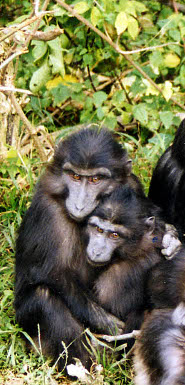Tonkean Macaque - Social Creatures
 Tonkean macaques (Macaca tonkeana) belong to the order Primates. They are part of the Cercopithecidae family, also known as Old World monkeys and are the biggest out of all the macaque species. They are native to Sulawesi in Indonesia.
Tonkean macaques (Macaca tonkeana) belong to the order Primates. They are part of the Cercopithecidae family, also known as Old World monkeys and are the biggest out of all the macaque species. They are native to Sulawesi in Indonesia.Tonkean macaques are very social animals, perhaps more social than many others in their species. They love climbing, playing and swinging in the trees of the tropical forests. They also spend a lot of time on the ground with other male and female members of their troop. Juvenile tonkean macaques enjoy play-fighting while the female primates go about their grooming rituals. Unlike many other primates, tonkean macaques have no dominance hierarchies and are not considered to be aggressive towards each other. In order to keep peace within the troop, a third adult will often intervene when two adults engage in a squabble. Female tonkean macaques give birth to one offspring at a time.
Tonkean macaques are strong, hardy primates and are dark brown to black in color with gray cheek tufts and ember colored eyes. They have long snouts and short tails, from one to two inches long. Their weight typically ranges between 8.6 kg (19 lbs) to 10.4 kg (23 lbs) and their length ranges from 500 mm (19.7 in) to 675 mm (26.6 in). Diet includes fruit, leaves, flower stalks, buds, bamboo seeds and some insects and they have been known to raid cultivated crops for maize and other vegetables. Because of their plundering behavior, they are considered to be agricultural pests and are often poisoned, trapped and destroyed. The lifespan of this species is currently unknown.
Tonkean macaques are considered to be vulnerable by the International Union for Conservation of Nature (IUCN). Besides being trapped and killed by crop owners, these primates are also being trapped and used for food and for domestication. Their habitat is in danger as well. Their land is being used more and more for oil palm plantations, cacao plantations, as well as for human settlements. Members of the macaque species are often used for animal testing. Predators of the macaque species include large cats and large reptiles, but the biggest threat are humans.
Tags used in this posting
Other entries about 'primates'
- Gerp’s Mouse Lemur - Primate Discovered in 2012
- The Japanese Macaque - Hot Springs-Loving Similian
- The Lion-Tailed Macaque - A Crying Old Man
- Gray-backed Sportive Lemur
- Cotton-top Tamarin - Rock Star of the Forest
- The Calabar Anwantibo - Nature's Hanging Lover
- Proboscis monkey - The swimming star with the giant nose
- Patas monkey - Racing guenons of the African savannahs
- Crested gibbon - At home in the top of the trees
Other entries about 'south_east_asia'
Add your thoughts about this animal:
